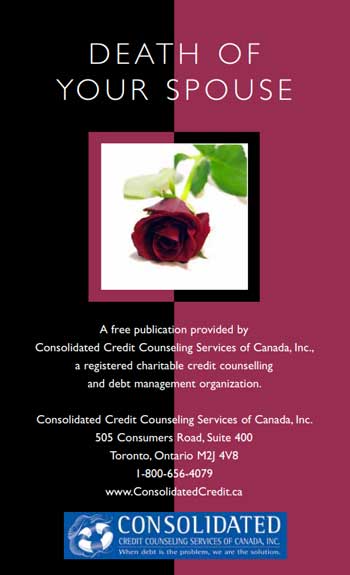
Death of Your Spouse
Losing a spouse is a very stressful event and usually the last thing on a person’s mind is getting their financial situation organized. This can be an overwhelming task, especially if the spouse who has passed on did not keep an organized record of his or her financial affairs.

Congratulations on taking this important step to a brighter financial future. Consolidated Credit Canada has been helping Canadians across the country solve their credit and debt problems for years.
Our Educational Team has created over twenty-five publications to help you improve your personal finances. By logging onto www.consolidatedcreditcanada.ca you can access all of our publications free of charge. We have tools to help you become debt-free, use your money wisely, plan for the future, and build wealth. The topics Consolidated Credit Canada addresses range from identity theft to building a better credit rating; from how to buy a home to paying for university. On our website, you will also find interactive tools that allow you to calculate your debt and see how much it is costing you.
We are dedicated to personal financial literacy and providing a debt-free life for Canadians. If you are overburdened by high-interest rate credit card debt, then I invite you to speak with one of our trained counsellors free of charge by calling (844)-402-3073 for free professional advice.
Sincerely,
Jeffrey Schwartz
Executive Director
Consolidated Credit Canada.
Financial Steps to Take After the Death of a Spouse
What to do First – Before Debt Piles Up
Organize Yourself
Losing a spouse is a very stressful event and usually, the last thing on a person’s mind is getting their financial situation organized. This can be an overwhelming task, especially if the spouse who has passed on did not keep an organized record of his or her financial affairs. It is also very important not to do anything rash; make a plan first because you will be going through a time of adjustment, personally and financially.
You may want to enlist the help of a few trusted family members to assist you with this daunting task, but be very careful because your private affairs should be kept confidential. Start by making a comprehensive list of every financial element and source of debt that will need to be focused on.
For example:
• Funeral service and burial costs
• Estate, will and trust matters
• Income and employment matters (such as pensions, or social security benefits)
• Investments (mutual funds)
• Tax documents (income or property tax-related)
• Current bills (rent, mortgage, credit cards, etc.)
• Miscellaneous expenses
Once you have created this all-inclusive list of every financial consideration, determine the resources that can assist you in managing them. This means making another list of the professionals you will need to contact, such as lawyers, tax accountants, investment advisors, credit counsellors, etc. You can then determine what elements on your list are most pressing and need to be taken care of right away, and what others are not. This is simply prioritizing these items.
If you think that you will have a hard time paying off your unsecured debts (credit card debt, old utility bills, unsecured loans, and personal debts) in a timely fashion, a credit counselling service can help you manage your debt, pay your creditors, and teach you how to create a budget that is best for your financial future.
Reputable consumer credit counselling services focus on educating their clients on their finances and try to enlighten them on the legal matters that may be entwined in their personal matters. Don’t be afraid to ask for help from a credit counselling agency or legal advisors.
The more you educate yourself on your rights and the nuances of your personal financial circumstances the better off you will be in the long run. You certainly don’t want to be surprised or blindsided by debts that you are not prepared to pay.
Here are some items that you should take into consideration:
Are there any outstanding debts on any credit cards that you have co-signed?
Some creditors may write off the debt acquired by a deceased customer, this is not the case if a co-applicant is on the account. If you are a co-applicant, then you will become exclusively responsible for the outstanding debt upon the death of your spouse.
Remember that by law, creditors cannot close a joint account automatically. Many times the creditor will ask the surviving applicant to file for a new application. Based on the surviving applicant’s credit history, the creditor will decide if they want to extend credit to the surviving applicant or if they do not want to extend credit.
Do you live in a community property province?
In a community property province, married couples are considered to own their property, assets, and income jointly. In a community property province, credit accounts opened during the marriage are automatically considered to be joint accounts. This could impact what you will have to pay back to your creditors, especially if your spouse incurred a maximum amount of debt on his or her credit cards.
Quebec is the only community property province in Canada. However, only spouses who married without a contract before July 1, 1970, would be under a regime of community property. (Source: www.cba.org)
Tips to Help Avoid a Financial Crisis
Dealing with financial matters during this stressful time is never pleasant, but it is important to take matters into your own hands to avoid a financial disaster. One of the things you can do, if you already have not done it, is establishing a strong credit record in your own name. This will not only help to build up your credit prowess, but it can also save you from many potential problems in the future.
Try to create an emergency budget to help with debt management issues as they come at you. A credit counselling agency can help you build a budget that fits your financial situation.
Who should you contact after the death of a spouse?
Some are obvious but it is good to make a list. Call family, friends, and relatives; church and funeral home; executor named in spouse’s will and/or trustee of spouse’s trust— there may be a funeral or other special instructions.
Next, you need to list who to call after the funeral. You will need to check on retirement or other funds; spouse’s employer to check on wages, accrued and unpaid vacation time, sick pay, death and retirement benefits; Canada Pension Plan; Old Age Security; insurance agents on policies and claim forms; banks, brokerage houses, and other financial forms for account status and ownership; trustee of any trust; Department of Veterans Affairs if applicable; lawyer to determine if a probate is needed (if living trust or non-probate transfers occur, or in a small estate, a probate may not be necessary); credit card companies.
Also, cut up your spouse’s credit cards. As stated earlier, you may use credit cards held in both your names, but the company may request a new application. Some credit card companies provide death benefits.
What Documents and Information to Assemble
Have the following documents in a central location:
• Will, trust, and letters of instruction;
• Life insurance policies;
• Retirement plans and CRA information;
• Birth certificates;
• Military discharge papers;
• Marriage license;
• Deeds on property owned by your spouse;
• Vehicle registrations for motor vehicles, trailers, and recreational vehicles;
• Recent bank and financial account statements;
• Recent tax returns;
• Loan documents, including mortgages and other loans;
• List all outstanding debts, as of date of death, such as credit card bills and utilities.
• Copy of the most recent bill received right after date of death;
• Social Insurance card;
• Financial statement or list of assets as of date of death.
Be sure to get 10 to 15 copies of your spouse’s death certificate for the Canadian Pension Plan, lenders, insurers, and other institutions so you can change the name on applicable accounts or collect any money that is owed to you.
The Question of Probating Your Spouse’s Estate
Probate is the legal process where a court determines if a will is valid or that no will exists and provides distribution of assets to beneficiaries as designated in the will or by law if no will exists.
You may not be required to probate your spouse’s estate. Even if a probate isn’t required, most provinces require you to file the will (with the probate court or the municipal record office) within a certain number of days of your spouse’s death. Call the probate court or contact a lawyer.
Probate is not needed in the following situations:
• Property held in trust. (Many people today plan their estates to avoid the costs and delays of probate through a revocable living trust. Property that has been conveyed and titled in the name of trust need not be probated.)
• Joint tenancy with right of survivorship property (often bank and financial accounts and sometimes real estate) passes to the surviving joint-tenant free of probate. This is sometimes called “tenants-by-the-entirety” for a husband and wife.
• Financial accounts or other assets often pass automatically to a third party through a Payable on Death (POD) designation.
• Life insurance, annuities, and retirement benefits usually have a beneficiary designation that controls the distribution of that asset free of probate.
• Small estates—most provinces allow the surviving widow or beneficiary of a small estate to simply file a form affidavit. (Source: Canadian Bar Association)
If probate is needed, contact a lawyer who is familiar with probate law. He or she will guide you through the simplest and most cost-effective way to handle the probate of the estate.
Paying Taxes
As a general rule, the property you receive by inheritance comes free of income and estate taxes. To avoid paying an immediate income tax on retirement funds, be sure to review your options to roll over or receive periodic payments.
The year your spouse dies, you still receive favourable joint return tax rates and standard deductions. If a probate is necessary, and the probate estate has enough income, an estate income tax return may have to be filed. If not, the income earned after the date of death is simply reported by the beneficiaries of the assets.
An estate tax return has to be filed with the CRA if the estate (including probate and non-probate assets) exceeds $600,000.
Pay Only the Bills You Should Pay
Before paying any bills, determine if it is your debt, your spouse’s debt, or joint debt. You are responsible to pay your debts and joint debts. You aren’t responsible for your spouse’s debt, since your spouse’s estate will pay those debts.
Loan agreements you have signed with your spouse, credit cards held in both names or used jointly, property taxes on property you both owned, and household expenses are joint debts. Hospital bills, funeral expenses, and legal fees incurred because of your spouse’s death are estate debts. (Source: The Executors Handbook, 4th Edition)
You should continue to pay your bills and joint bills. You may use your money, money held in joint accounts, and funds you receive directly without probate to pay bills and to cover all living expenses. You should not dispose of or spend assets in your spouse’s name that have to go through probate. Don’t forget the $255 one-time death benefit from Social Security. If you are short of income or assets because they are tied up in probate, once the probate begins you may be entitled to a monthly “widow’s allowance” from the probate estate.
Planning for the Future
It’s very difficult to move on once the death of a spouse occurs, but it is in your best interest and your family’s best interest to plan for the future.
Disability planning: If you become disabled or incapacitated, does someone have a durable power of attorney or durable power of attorney for health care to help you?
Estate planning: Examine your will or trust. Perhaps you should consider a revocable trust so probate can be avoided at your death.
Financial planning: Do you have enough income for now and the future? Should you take a lump-sum distribution of retirement funds or installment payments? If you do this be aware of any undesirable income tax consequences.
Experiencing the death of a loved one is never easy, but when it’s your spouse the financial realities must be taken care of or the consequences could be devastating.
Unfortunately, millions of dollars are lost by widows and widowers every day through unnecessary taxes, excess estate and probate expenses, litigation, poor investments, and rip-off artists.
Don’t let anyone take advantage of you; get the proper family, friends and professionals to assist you in making a sound plan that will protect your finances. At least you will have some peace of mind knowing that you made the right decisions regarding your financial future. It will be comforting for you and your family knowing that your hard-earned money is safe, working for you and available if you need it for an emergency situation, day-to-day living or for pleasure.
About Consolidated Credit Canada
Consolidated Credit Canada is a consumer-oriented, non-profit organization. We are an industry leader in providing credit counselling and debt management services. Our mission is to assist individuals and families in ending financial crises and to help them solve money management problems through education, motivation, and professional counselling. Our organization is funded primarily through voluntary contributions from participating creditors. Our programs are designed to save our clients money and liquidate debts at an excellent rate.
We are dedicated to empowering consumers through educational programs that will influence them to refrain from overspending and abusing credit cards,
as well as to encourage them to save and invest. Regardless of whether your financial problems are due to the purchase of a new home, the birth of a child, major illness, or any other circumstance, we can help.
* If you are headed for a debt disaster visit www.ConsolidatedCreditCanada.ca or call (844)-402-3073 for free professional advice by a trained counsellor.




